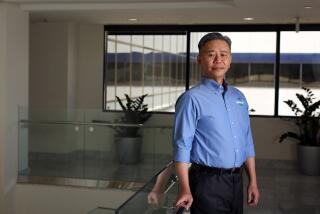Hong Kong’s ‘Cannon Xu’ Shoots Off Mouth for China
- Share via
HONG KONG — It’s slow going, but nearly every day, 87-year-old Xu Simin uses a cane to toddle up to his desk, where he sips Chinese tea while pondering his next salvo in a war of words.
By far the most outspoken champion of pro-Beijing thought in capitalist Hong Kong, Xu’s plea for more support of China often touches a raw nerve among many who cherish the capitalist lifestyle and worry that their Western-style liberties are threatened four years after Britain gave up this enclave.
“Even before the People’s Republic of China was born, I was already working for the Communist Party. Up until now--it’s been 52 years,” Xu, who runs the monthly political magazine Mirror, said in an interview.
Mirror can be as dry as it is unloved by most people here. The standard fare includes somber essays attacking those who support independence for Taiwan or Tibet, with a few ads for mainland Chinese foods and medicines to help lift revenues.
Xu himself is anything but dry. He’s known as “Cannon Xu” for his colorful outbursts--even at times taking aim at China’s government.
Xu calls himself a Chinese patriot, and in his unending campaign to instill more patriotism toward the motherland, he targets local pro-democracy activists, Western countries he accuses of conspiring against China and the freewheeling local media.
Not long after the hand-over by Britain, Xu stirred an uproar by lashing out at government-owned Radio Hong Kong as “a remnant of British rule” for its critical reporting on the Beijing and Hong Kong governments.
Xu’s relationship with the media is of the love-hate variety. He bombards local media, which he views as disrespectful and overly critical. His competitors, meanwhile, find Cannon Xu excellent fodder.
His snappy quotes and outbursts make good stories, so Xu finds himself mobbed by reporters whenever he appears in public. He is frequently invited to appear on radio shows and to attend press parties.
Most recently, Xu took aim at the Falun Gong spiritual movement, which he considers a destabilizing force.
Falun Gong is banned in mainland China but it remains legal in Hong Kong and often protests here, angering Beijing’s local allies.
Xu calls it U.S.-backed subversion, which fits with his theory that the United States feels threatened by China and wants to restrain it.
“They fear that China will grow strong. They fear that there are so many people in China,” Xu said.
The recent U.S. spy plane crisis heightened tensions. Xu places the blame firmly on President Bush, who is perceived as less accommodating to China than his predecessor, Bill Clinton.
“For its long-term interests, the U.S. shouldn’t be like this,” Xu said. “It’s wrong. Their China policy has been wrong for the past 50 years. China doesn’t pose any threat to the U.S., not a bit.”
Born to Chinese migrants in British-ruled Burma shortly after the Chinese monarchy was overthrown in 1911, Xu went into hiding in the Burmese countryside for three years for organizing anti-Japanese activities during the Japanese occupation of World War II.
Xu started supporting Chinese communists even before they took control of the mainland in 1949. That year, he joined the Chinese People’s Political Consultative Conference, an advisory body.
Two years after a 1962 military coup in Burma, Xu lost his Chinese-language newspaper business and, seeking refuge in the motherland, he took his family to Beijing.
At age 50, Xu hoped to serve the communist nation, but he was marginalized as an “overseas bourgeois” during the 1966-76 Cultural Revolution.
Intellectuals and the rich were persecuted. Affluent Chinese returning from abroad, including Xu, were criticized for their overseas links.
Xu was stripped of his monthly allowance at an overseas Chinese affairs federation, and he was forced to watch numerous hostile criticism sessions where other overseas Chinese were branded as “bourgeois anti-revolutionists.”
“I knew it was wrong,” Xu said. “I was disillusioned.”
He moved to Hong Kong in 1976 but remained loyal to mainland China. When the Cultural Revolution ended, he rejoined the Chinese People’s Political Consultative Conference, after a gap of a decade.
Although revered by China for his loyal service, Xu was never a Communist Party member, and his outspokenness and radical ideas have led to a few run-ins with the party.
He recalled that he earned the nickname “Cannon Xu” in China in the early 1980s when the mainland was becoming more liberal. Xu recalls debating communist ideology on television and, during advisory body conferences, he attacked corrupt Chinese state enterprise officials in Hong Kong.
After the 1989 Tiananmen Square massacre, Xu advocated the early release of jailed activists but found himself prevented from saying so before the political advisory conference.
Xu is fond of making bold forecasts, even predicting that the Communist Party’s monopoly on power in China won’t last.
“Give it another 20 years; there won’t be communist single-party rule in China,” he said. “China is changing. Do you believe China is still about Marxism, Leninism, communism? Capitalism--they love money even more than we do in Hong Kong.”
More to Read
Sign up for Essential California
The most important California stories and recommendations in your inbox every morning.
You may occasionally receive promotional content from the Los Angeles Times.










